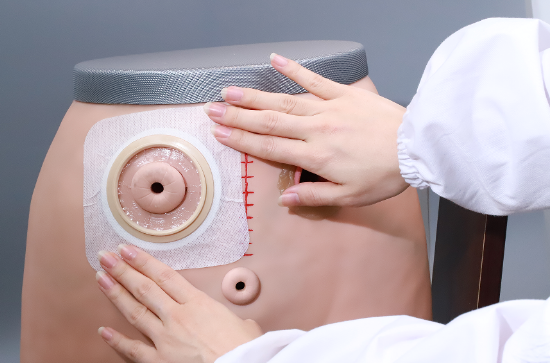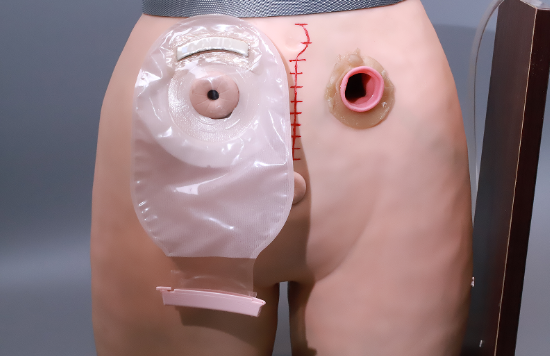Enterostomy is one of the common clinical operations, it is mainly used for the treatment of digestive system diseases, such as ulcer disease, pancreatitis, intestinal tumors, and so on. Although enterostomy is an operation, patients need to make certain preparations before discharge to ensure that patients can be discharged smoothly. However, many enterostomy patients often lack the necessary preparations before discharge, causing them to face many difficulties after discharge. Therefore, how to care for the intestinal stoma is an important issue, follow me to understand it.
Pre-discharge guidance:
Discharge guidance is an important task for patients with enterostomy before discharge. First of all, the ostomy nurse should let the patient understand their own situation, and give a reasonable nursing plan based on the patient's medical history, surgical conditions, type of ostomy, and quality of life after the ostomy.
also necessary to introduce precautions after discharge of the patient, such as the protection of the stoma, the adjustment of the diet, and regular visits to the doctor. In addition, it is also necessary to provide the necessary guidance for the patient's family to help the patient take better care of the stoma. Strengthening discharge guidance can improve the quality of patient discharge and reduce post-discharge problems.
a. Evaluation of stoma condition:
Pay attention to observing the blood supply at the stoma within 2 to 3 days after the operation. The color of the mucous membrane at the stoma site is ruddy and shiny, which means that the blood supply is good. Dark red is also normal. If there is pain, edema, or blackening, it means that the blood supply of the stoma is obstructed and needs to be dealt with immediately!
Observe the surrounding skin for redness and erosion
Observe whether the stoma is narrow, whether it is difficult to defecate, and the shape, color, regularity, and quantity of stool.
Look around the stoma for oozing, hemorrhage, or hematoma formation.
b. Learn about stoma products and their use:
1. Choose different ostomy bags according to the characteristics of different types of colostomy
2. Ascending colostomy and transverse colostomy: one-piece or two-piece open pocket, the best choice is a one-piece open pocket.
Descending colostomy and sigmoid colostomy: one-piece open bag or closed bag, two-piece open or closed bag are acceptable; if there is a lot of exhaust gas, it is recommended to choose an ostomy bag with carbon filter; Optional mini bag available.
c. Colostomy Diet Guidelines
In the short term after surgery, the diet should be light, mainly digestible and high-nutrition, and gradually transition to a normal diet. Although there are no restrictions on the types of food, good eating habits must be developed, and overeating and irregular eating should be avoided. Daily should eat more fresh vegetables and fruits, and drink plenty of water to keep the stool unobstructed.
Eat less odor-causing foods
A bad smell is probably the biggest headache for people with colostomy. Usually eat less food that is not easy to digest and prone to malodorous gas, such as corn, onion, eggs, fish, eggs, garlic sprouts, cabbage and cauliflower, spice condiments, etc., drink more fat-free milk or yogurt, and use foods high in chlorophyll. Green leafy vegetables help control manure odor.
Eat fewer gas-producing foods
Excessive gas production leading to the bulging of the stoma bag is also one of the concerns of colostomy patients. Therefore, it is necessary to avoid eating foods, fruits, and drinks that increase intestinal gas
① High-starch foods: radish, potato, sweet potato, taro, pumpkin, chestnut, etc.
② Vegetables and fruits: onions, cabbage, mustard greens, cucumbers, green peppers, leeks, peas, radishes, apples, watermelons, cantaloupe, cauliflower, cabbage, shallots, pickles, etc.
③ Certain behaviors such as chewing gum, smoking, and talking while eating can also increase intestinal gas. Therefore, it is advisable to chew slowly and talk less when eating to prevent swallowing air
Provide psychological support:
Patients with enterostomy usually need to bear a certain amount of psychological pressure. Therefore, family members and hospitals need to give more care to patients spiritually. They may worry about the sequelae of the ostomy and life after discharge from the hospital. Therefore, we need to provide the necessary psychological support to help patients relieve stress. We can have in-depth communication with patients, understand their psychological needs, and provide them with psychological support. Providing psychological support can improve the mental health of patients to facilitate their recovery.
For more information on Innomed®ostomy pouch, refer to the previous articles. If you have customized needs, you are welcome to contact us; we will serve you wholeheartedly. At Longterm Medical, we transform this data by innovating and developing products that make life easier for those who need loving care.
Editor: kiki Jia
Date: May 31, 2023

 English
English عربى
عربى Español
Español русский
русский 中文简体
中文简体








